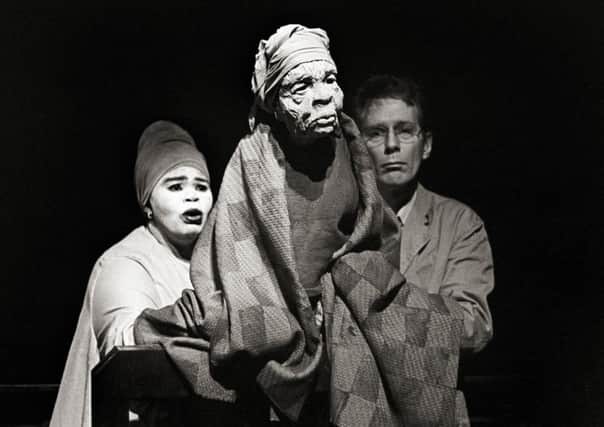EIF theatre review: Ubu and The Truth Commission


Ubu And The Truth Commission
ROYAL LYCEUM, EDINBURGH
Star rating: * * * *
Its central image – of the relentlessly boorish tyrant Ubu, and his grasping wife Ma Ubu – is essential and striking, yet its detail often seems shouty and repetitive.
And when you try to graft the story of Ubu’s casual savagery and relentless self-interest onto one of the great political narratives of our time – the fall of the apartheid regime in South Africa, and the nation’s 1990s struggle to come to terms with its horrific history of racial violence – you add whole layers of complexity, challenge and seriousness to a story that already combines absurdity and horror in a uniquely dangerous way.
Advertisement
Hide AdSo it’s a measure of the huge achievement of William Kentridge and the Handspring Theatre Puppet Company, in their great 1997 show Ubu And The Truth Commission, that they succeed in welding these two narratives into a brilliant, complex and troubling show, which leaves the audience facing tough questions about the choice the new South Africa made, when it decided in 1996 to launch its Truth And Reconciliation Commission, and to offer amnesty to those who committed crimes against humanity under apartheid, in return for a full and honest account of their actions.
Over a brisk 90 minutes, Kentridge’s show – scripted by Jane Taylor, and featuring puppets by the great Adrian Kohler – uses every theatrical means available to dramatise the extreme and often distorted moral landscape through which Dawid Minnaar’s powerful Ubu moves, in his role as a secret policeman paid to murder activists and dissidents.
There are sharp animations of a man-turned-killing-machine, along with songs, shadow-play, haunting archive footage of confrontations between police and demonstrators; and above all, there are the puppets, including the three attack-dogs of Ubu’s police team, and – most unforgettably – the dignified, sorrowful small puppets who represent the families of Ubu’s victims, giving evidence to the commission. There are moments when all of this looks almost like a ragbag of poor-theatre techniques from the 1980s, and when its distancing, thought-provoking Brechtian style seems to clash with the more emotion-seeking ethos of today. Yet it also offers moments of great horror, stillness and significance, woven into a fast-moving small-scale spectacle.
In the end, of course, this Ubu remains undefeated, as in Jarry’s play. He and his capacious, sensual, and violence-loving Ma Ubu – brilliantly played by Busi Zokufa – are seen sailing off to corrupt fresh lands, as the new South Africa trades the long-term pursuit of justice for the imperfect and insincere version of the truth Ubu has offered.
In this great reflection on political evil in our time, in other words, humanity’s corruption remains unpunished and unrepentant; while the best of what humanity might be is sculpted into the grieving faces of small puppets, beings uncorrupted by the flesh, and by the lust for power and wealth that makes monsters not only of Ma and Pa Ubu, but of countless other power-holders and power-seekers, across our 21st century world. • Run ends today Seen on 28.08.14